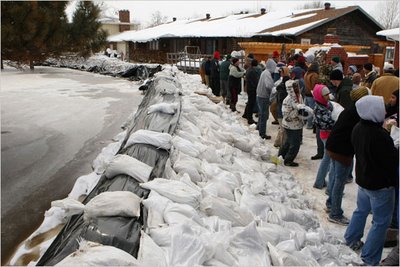Dorso Column: Build Fargo's Flood Diversion

In my book When Governance Worked there are two chapters relevant to the legislative debate that is now taking place on the Fargo Diversion. Chapter 7 “FARMERS- The Big Dogs and Chapter 8 WATER-They Are Still Fighting was put in that order for a reason. I’m also tempted to say at this point “I told you so.”
When it comes to control of water I find that most logic is thrown out the window. Sorry Rob but your recent comments on the Fargo Diversion were almost absurd. How does the owner of agricultural land south of Fargo have more rights then the home and business owners of real estate up stream? In fact if you were to take the total assessed value of the land protected from floods versus the agricultural land that may be affected it wouldn’t even be close. If you don’t like that argument, how about this? How many people’s lives are affected negatively inside the protection versus those outside the planned diversion?
I am not a hydrologist but I think it is pretty well undisputed that the ditching and draining of farm acres have contributed to floods. That would be as true in Devils Lake, Grand Forks, or Minot as it is in Fargo. Notice I didn’t say caused floods just contributed. If you were to step back 400 years and had the same kind of winters the Red River Valley has experienced in recent history you’d see this. Hundreds of thousands of acres under water until the natural water ways such as the Sheyenne and the Red Rivers carried the water north. As a reminder our neighbors in Manitoba especially Winnipeg built flood protection decades ago.
The land in the Red River Valley was the bottom of old Lake Agassiz. It is flat, fertile and doesn’t drain well unless man intervenes. This farm land was drained so that farmers could get into the field early and plant their crops. A secondary benefit was when the valley gets summer torrential rain, as it does periodically, the crops aren’t flooded.
So let us be honest. Richland County wants to get rid of the water so its farmers can plant corn earlier. The earlier the corn can go in the longer the growing season and the more bushels of subsidized corn can be grown destined for the ethanol plant in Wahpeton. I think I read where SAB was wondering if we should still be subsidizing corn production through the indirect subsidy of ethanol? Or maybe we should change the dynamic by referencing Red River Valley sugar beet production.
I was surprised by the legislator’s votes on the recent amendments to the water commission appropriation. It wasn’t long ago that Bismarck legislators were up in arms about the flooding along the Missouri below Bismarck/Mandan. If it weren’t for the Garrison Dam there never would have been the residential development along that stretch of the river. Was the dam built taking the Indian and farm lands north and west so that housing could be built in those two communities? Yet we must be fair to the agricultural interests in Richland County.
So goes the ongoing battle over water. Some of you are now saying he is anti ag. You couldn’t be more wrong. I built a business serving the transportation needs of farmers and ranchers. What I am saying is that when public policy makers are making decisions about water they have to weigh the social and economic needs of everyone affected. In any battle over water there are winners and losers. Legislators are going to have to decide how it comes out. At this point they have to put their bias behind them. Issues such as the design of the project should be handled by experts taking into consideration the concerns of everyone affected. I doubt there are any legislators qualified to serve in that capacity. The funding mechanisms are legitimate concerns of legislators.
If the recent votes on the water commission budget are indicative of support for the Fargo Diversion I am greatly saddened. In the 90’s when Grand Forks or Devils Lake needed state dollars for flood protection I didn’t waiver in my support. I didn’t ask who the winners and losers were. I just knew that there was a need. The design of those projects was left to people more knowledgeable then those of us in the legislature.
If legislator’s votes on this issue are because they are anti Fargo they are wrong. If those votes are because they support agricultural interests they are wrong. If it is because they have legitimate concerns about where the money will come from I understand. The old chicken and egg argument is always a concern when dealing with the Federal government. It can’t be that hard to craft amendments that make funding contingent on certain financial aspects of the project.







